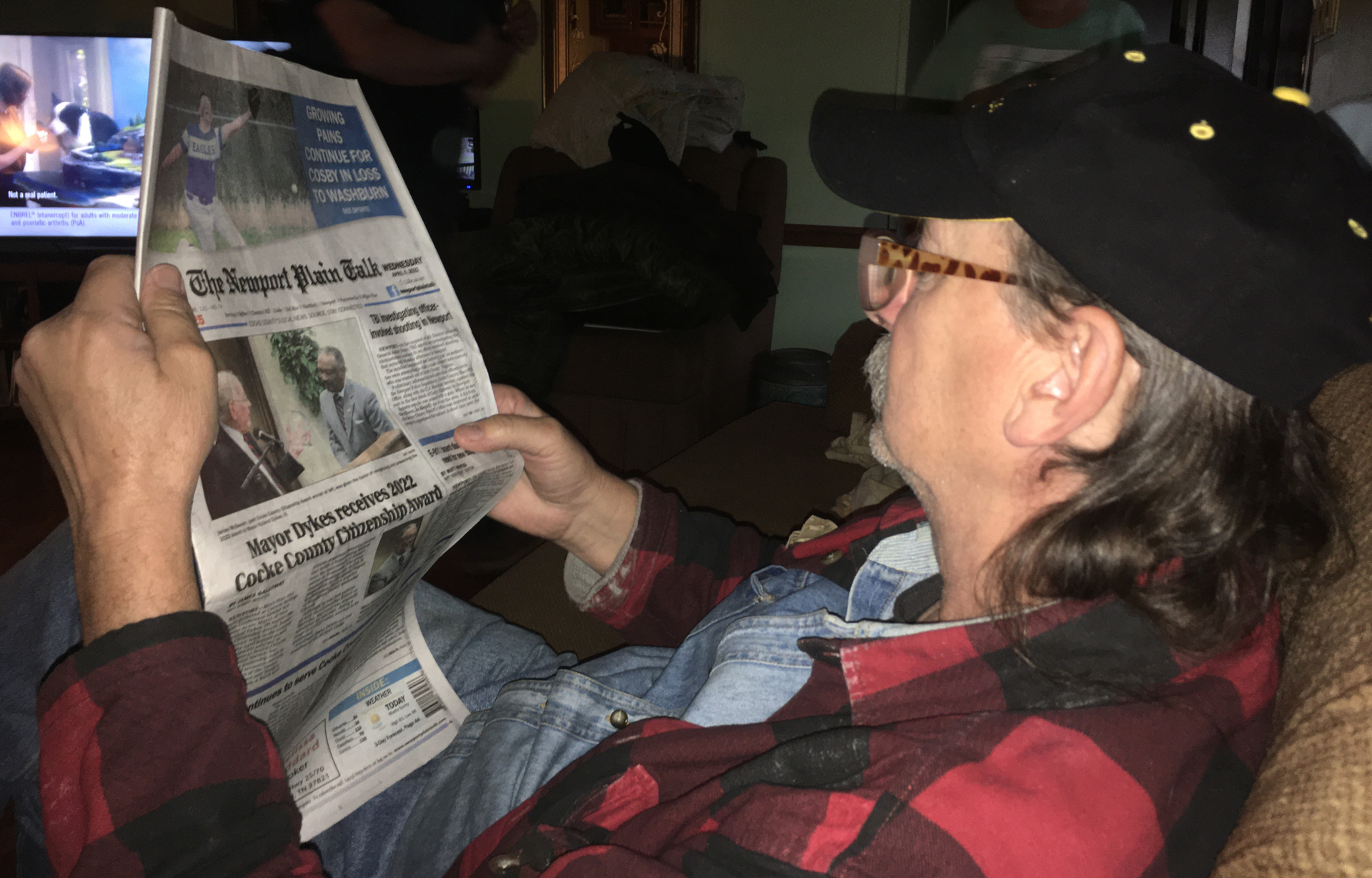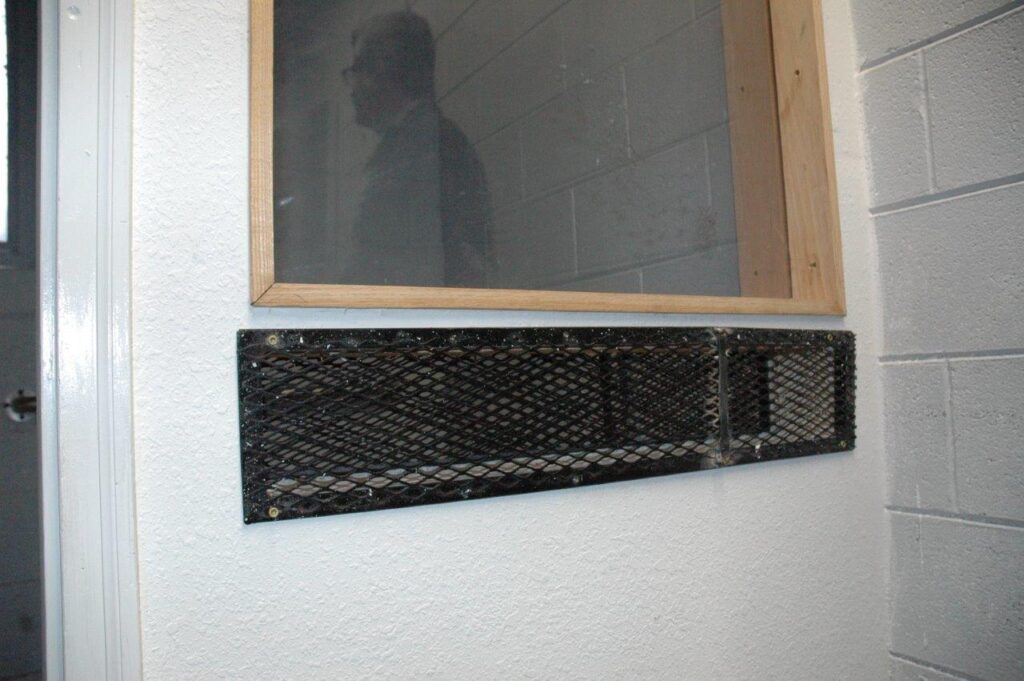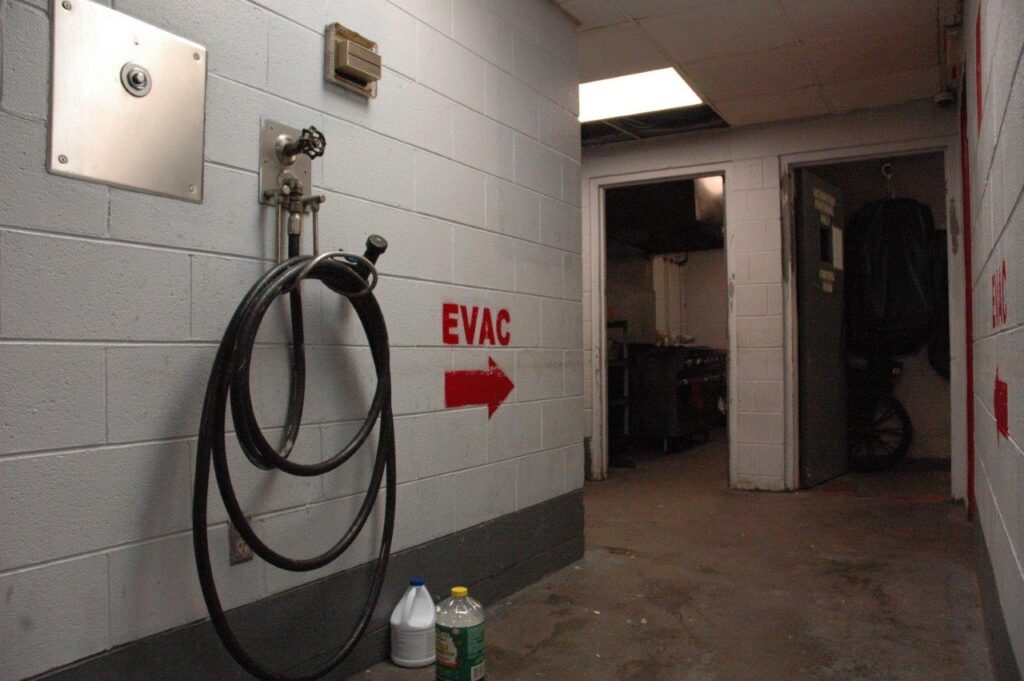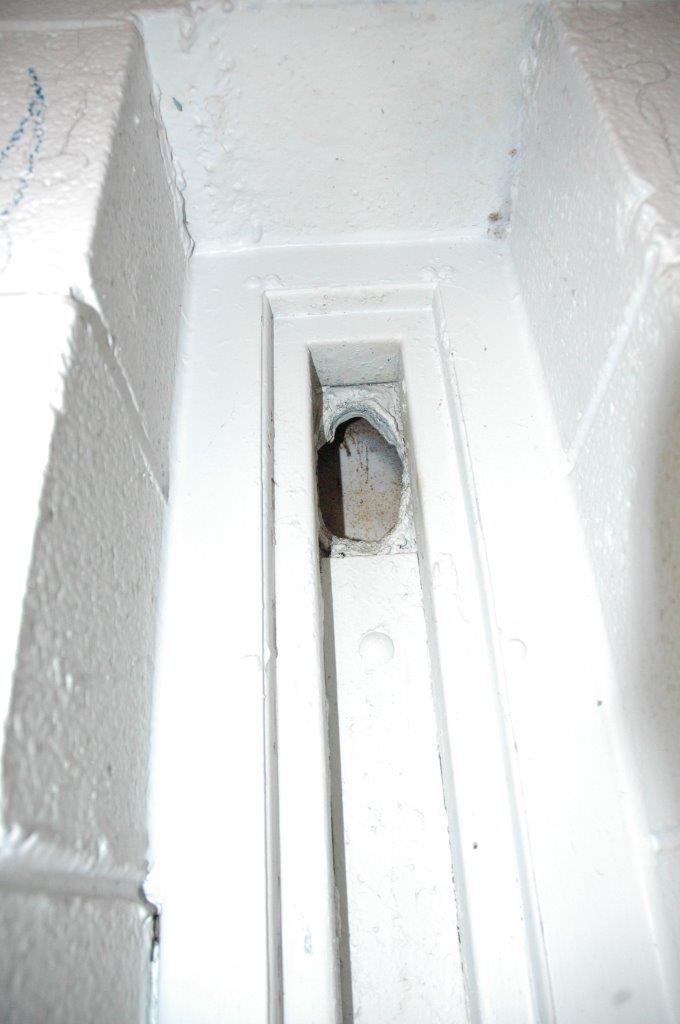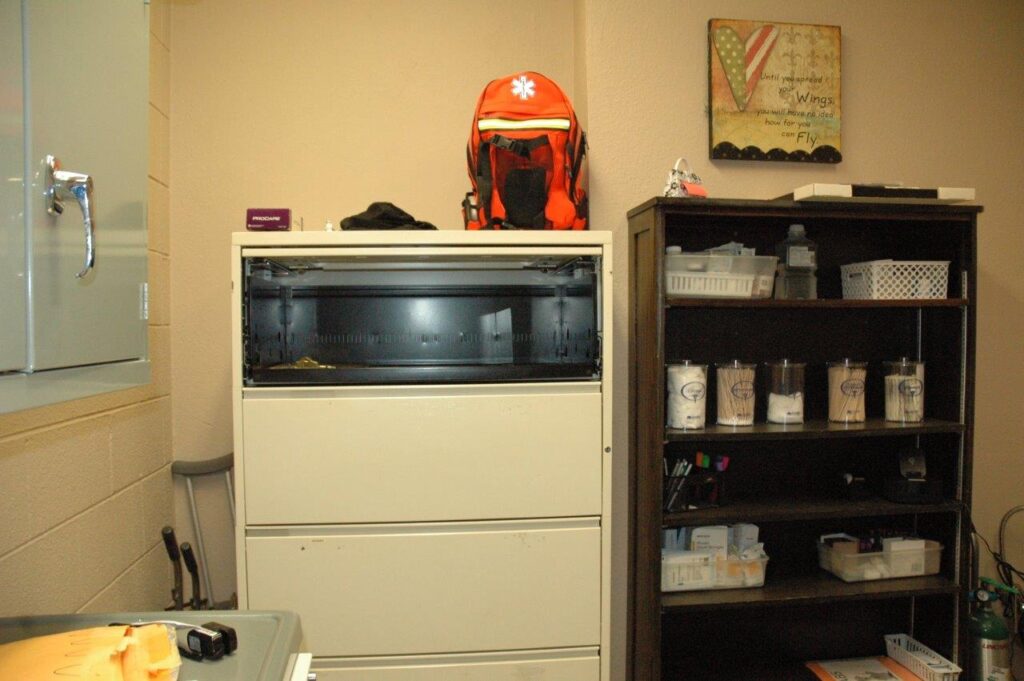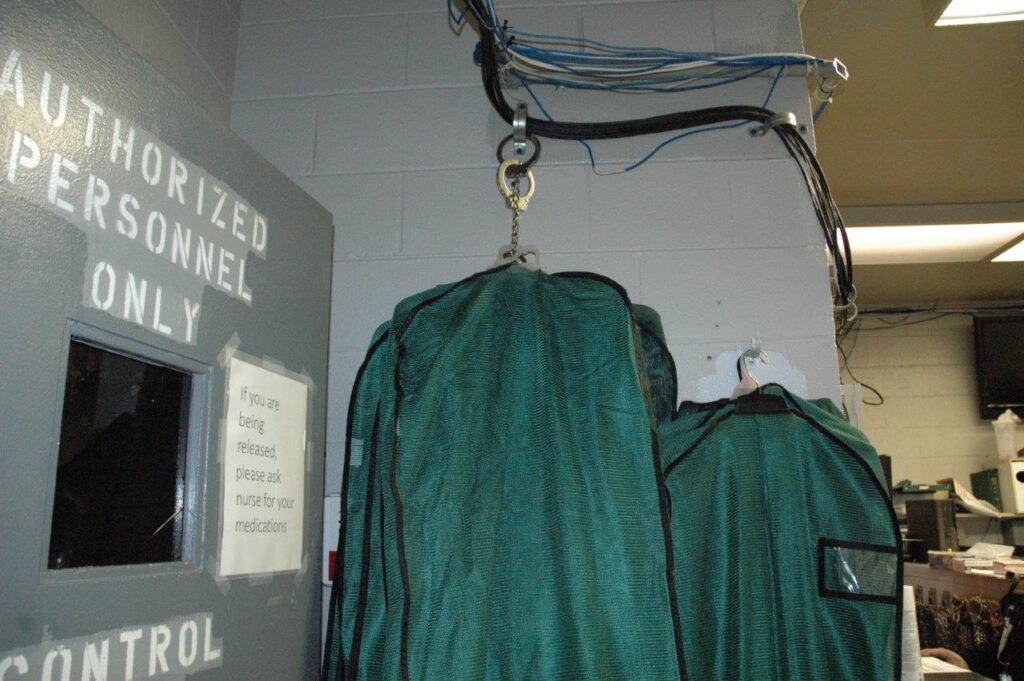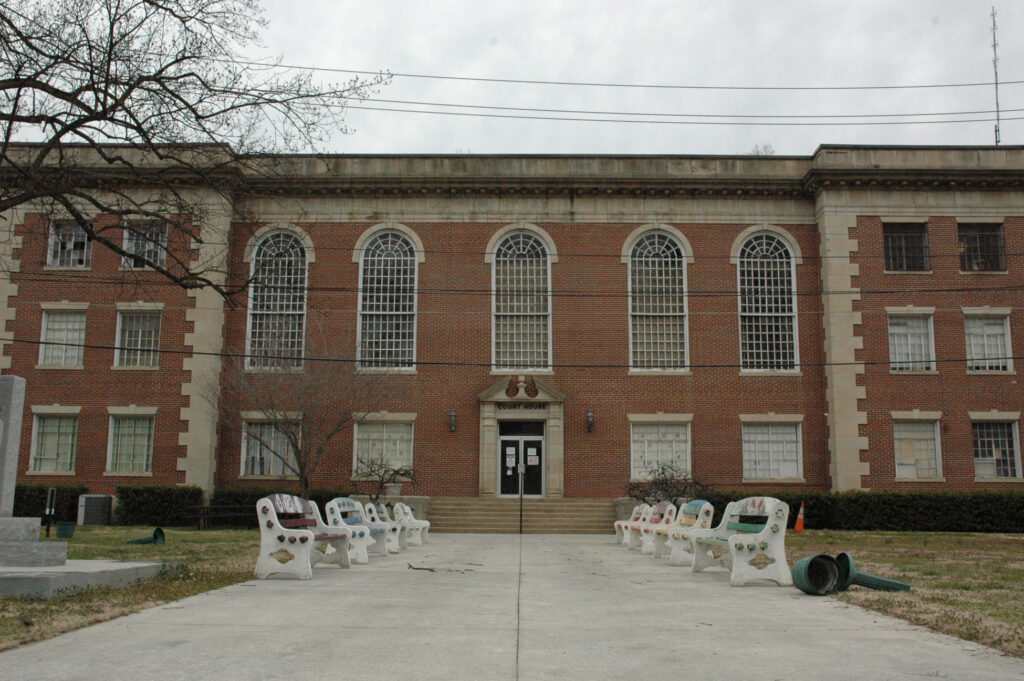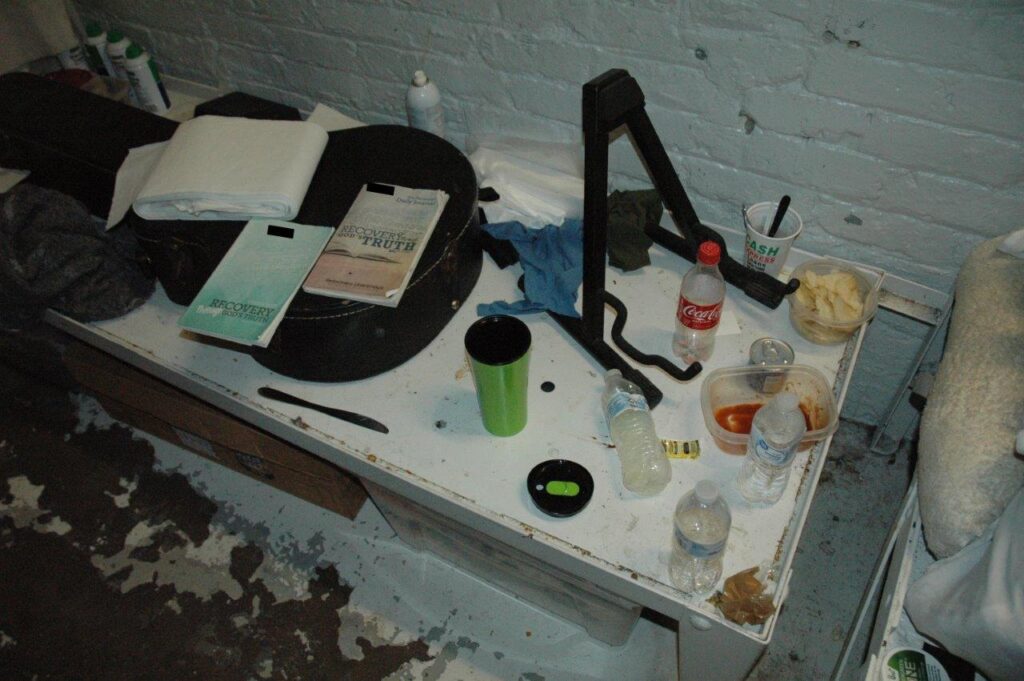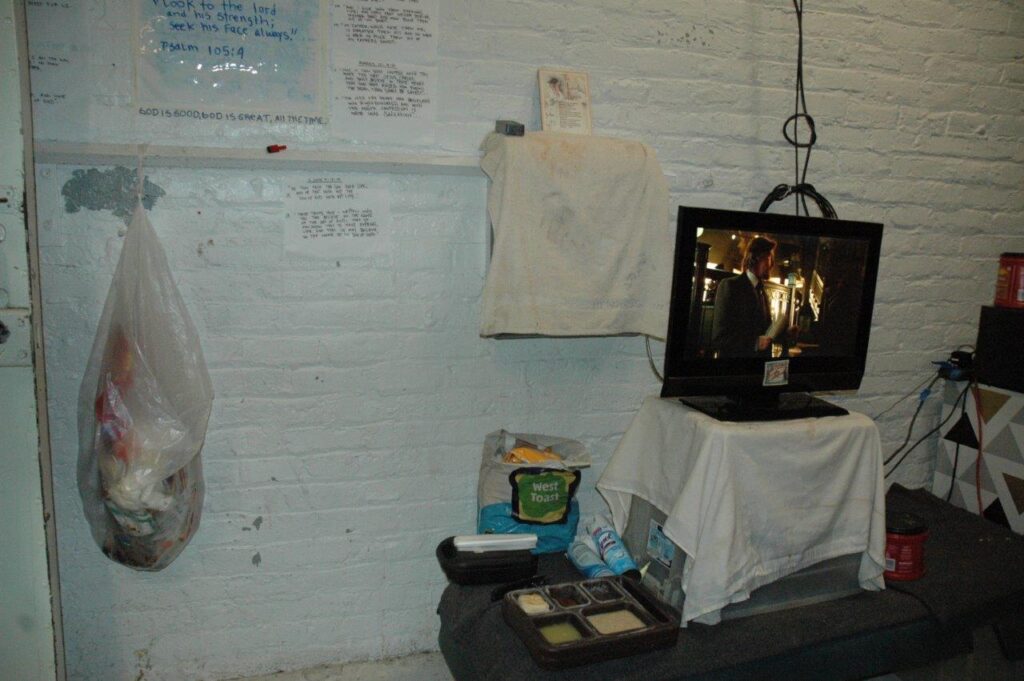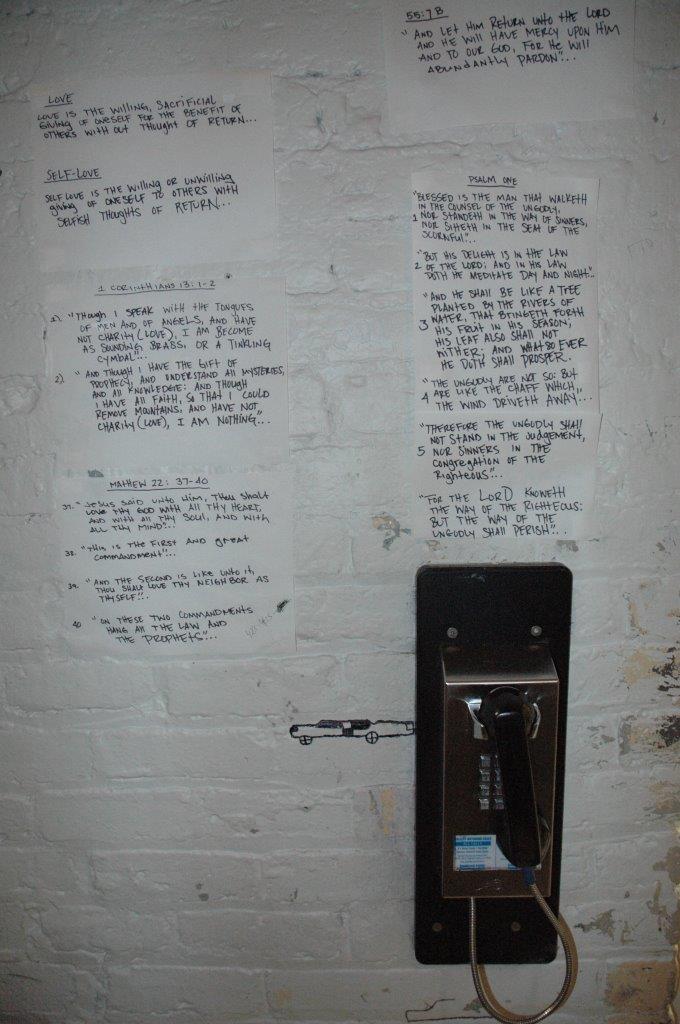Zoning could protect county identity, committee hears

NEWPORT—A drive through the beautiful Cosby area offers a relaxing glimpse of country life, where time slows to a crawl: gorgeous mountain scenery, waterways, old houses on curvy roads that trace a stream. These otherwise picturesque scenes, however, are punctuated by strange warning signs: “We don’t want to be Pigeon Forge,” or, “We don’t want to look like Gatlinburg,” and, “Broadband when?”
The signs mark a shared suspicion of uncontrolled growth, outside acquisitions, and issues residents fear could arise from spurious foreign investment, like heavy traffic. With no rules in place to reassure them, it is not unreasonable to see people using their land to make a statement. Better a sign out front, than gridlock on a country road. Overheard conversations turn tense, or even hostile, when residents hear each other talking about improvements to the county, because there are no rules in place to control growth, however well intended or positive the outcome may be.
On the other hand, there are no rules protecting residents from having rock quarries built next door, or commercial-scale burn operations adjacent to residential houses, both of which are taking place around the county now, which holds the dubious distinction of being one of just two counties in Tennessee with no zoning laws whatsoever, leaving Cocke County open to further exploitation.
Municipalities where natural beauty is paramount walk the line between protecting that beauty while maintaining a healthy and functional economy. Simply having no rules has done well to drive out mature business owners that want to see their investments protected, property attorney Jeff Greene told the General Committee during a July 14 meeting at the Chancery Courtroom in the Annex. If growth is inevitable, he says, that growth can be controlled.
“The only way to make sure that happens is if we have some rules in place before the growth starts,” Greene said. “Without it, I can put a billboard on every parcel running up and down Cosby Highway, I can build a five story hotel, I can build a junkyard beside it.”
Commissioner Gayla Blazer was turned around in her chair to hear Greene. She leaned forward to address him.
“But it’s sort of like a conundrum,” she said. “You say, ‘Before the growth starts,’ but then again, we’re not growing because we don’t have those [zones] there.”
Developers need reassurances that they can operate in a location, Greene responded, but with zoning in place they are also required to go before the county for permission to make changes. He used the example of roads.
“Roads are a huge issue. Gravel roads, ways, lanes, things like that out in the county. Can you divide off of them? Can you not?” he said. “Zoning, again, now when someone wants to do this, they’ve at least got to come before the county and say, ‘I’m going to build a new road.’”
He said zoning would help in sub-developments and ensuring everyone has a good title, including access to utilities and water on their lots.
Cocke County Partnership President Lucas Graham attended the meeting to talk about his role in developing a mode of zoning that would best serve Cocke County. By now Graham has heard all the criticisms, complaints and encouragement available to a person tasked with bringing business into a county that desperately needs money, but does not want the changes that might come with it.
Whether any zoning rules are put in place or not, Graham has used a $120,000 development grant to hire engineers – the same minds responsible for helping zone the Cherokee nation, as well areas of Asheville and Knoxville – and work on a community study that would end with recommendations for how the county might possibly be zoned.
He is taking a conservative approach to that process, being careful not to go too far, too fast.
“We’re going to have to look at a ‘training wheels’ version that would provide some protections,” he said, “and then the least that we could do is some planning, along with that. So they have recommended what you call, just a permitting—or we implement a zoning policy, but by permit.”
Graham said such permits would define general commercial district areas.
Commissioner Gary Carver, also in attendance, said in other counties the most basic of zoning tools at their disposal allow county governments to identify commercial corridors, and the rest is either residential or agriculture. He said it is up to individual counties how loosely they want to define those areas.
Part of the grant process Graham is involved with invites public input, giving county residents a say in how the government should proceed with guidelines from the engineers recommended by the state.
“You don’t even have to do what they say,” he said.
There are $144 million in new state roads coming, which bring about change whether counties want it or not. The idea, Graham said, is to get ahead of those changes through planning, lest it turn into a nightmare. The state has advised the county to have a plan.
Chairman Forest Clevenger interjected to clarify that zoning has nothing to do with ordinances telling people how they can use their own land. Later, Greene would add that existing properties are grandfathered in and nothing would change there, either.
“A lot of people do confuse ordinances with zoning,” Clevenger said. “We’re not trying to dictate what someone can do with their property. It’s more like protecting you, and your property. As it is right now, I mean, somebody could build a chemical plant right over here behind the sub-division and there’s absolutely nothing that we could do to stop it.”
Clevenger said that people have been coming to him with complaints because he openly supported some development in Hartford.
“Yeah, I do support smart development in Hartford, but like I said, we have no control over that, and they can be as angry as they want to with the CLB,” Clevenger said. “Of course, you know they’re going to blame us for anything that happens, but we have no authority to stop or start anything.”
With zoning in place, it would be incumbent upon the public to show up to government meetings and give their input, and often times it is the public who must go up against corporations when it is time to resist those changes, but it also provides the best legal means for controlling changes in a given area.
Greene said the community study would need to be completed to determine how to zone, but that zoning in other counties where he has worked has improved conditions in those areas, bringing growth to cities and counties. He said the debates in those areas included people who were against zoning, those who were for it, and those who wanted to see a more nuanced approach. He said zones are intended to build communities while protecting them from the excesses of growth.
“Because now, this area over here is set aside for an industrial park. You can’t build an industrial park over here in the mountainous region of Hartford where we want to protect our beauty and everything else,” he said, in reference to hypothetical zones.
“You could put a development district in Hartford—just district that out as its own special development district, have a commercial, have business zones. You could do multipurpose zoning. But what you don’t want to have happen is – and the reason things don’t develop as quickly, in my opinion, is – we put sewer in, we have Hyatt come in and want to build a hotel here. Well, Hyatt wants to know if, next door on that 100-acre tract, am I going to get some commercial development here, or am I going to get an industrial park, or am I going to get a pig farm? That zoning would help when someone wants to come in and develop a different piece of property, they would at least be able to determine what would come in around them.”
“I think that helps us recruit business and would help Lucas be able to recruit business, but like he said, and like you just said, this is not land use ordinances. This is zoning. This is, ‘This section of the county is more agricultural and we want to keep it agricultural, so we’ll do this here.’ You know, you do a residential and you do a business section, and from there, you would be able to then decide, ‘Do we want to delineate those into a smaller type of zone?’ But I think we really just need, like he says, the basic zoning overlay of the county, and then from there work on the districts that we want to see developed. You know, if we don’t want this district to develop, zone it so that development really can’t go quickly there. And if we’ve got a district that—an area that we really want to see grow, zone it so that you can put businesses in there that will come into that zone and grow.” —Greene
“I don’t think it restricts the county,” Greene said. “I’ve seen that argument, and I’ve seen it play out over a 10-year period, that it actually – after time – really does help the county draw in more people than run people off.”
Blazer asked Greene if there is a county nearby that does not have some type of zoning.
“There is not,” Greene said. “It’s not that people don’t want to come here. It’s that they don’t want to put $50 million into a project not knowing … they have no protections for their land use whatsoever.”
Graham said that is referred to as “investor confidence” in his office.
Greene said Cocke County is decades behind the rest of the state in adopting zoning.
In his summary statement, Graham balanced his desires to see economic growth in the county with the concerns of citizens who are opposed to change or development.
“Relevant to the upset folks that are up in the Cosby corridor right now, because of 321,” he said, referring to the proposed expansion of a five-lane highway through the area, “a reasonable concern, but that’s not—it doesn’t matter if that road’s five-lane, six-lane or 10-lane. That has nothing to do with what that corridor’s going to look like, and right now there’s absolutely zero—the only way that they’re going to get what they want is if we have a plan, or at least a commercial corridor, that restricts somewhat.”
As Graham finished his statement, Blazer continued.
“The way it is right now, they could just—anybody could go build, do whatever they want to do up there,” she said, “and they have no recourse at this time at all.”
Clevenger said he thinks there will need to be “many more” public meetings like this one, before anything can be put into place.
The work of putting together a committee, seeing that stakeholders are on that committee and hearing input from others with a vested interest, will fall on the next mayor.
Friends Animal Shelter will not renew county animal control contract

NEWPORT—The Friends Animal Shelter of Cocke County published a statement on Facebook and sent a letter to Mayor Crystal Ottinger saying they will not be renewing a contract that expired on June 30. The no-kill animal shelter, which has taken in more than 2,250 cats and dogs since beginning their contracts with the county, said in their statement that the county’s recent refusal to increase their annual budget by $11,000 to meet the rising costs of sheltering the animals played a role in the decision.
However, in Thursday interviews with The Newport Plain Talk, Friends Animal Shelter board member Alison Chiaradio and her husband Bob said pressure from the county to begin euthanizing animals also factored into their decision.
In every sheriff’s report involving an animal that gets picked up, deputies write that they delivered the animal to Friends Animal Shelter, where an after-hours run is provided to the county, as well as mandatory spots to be left open should the county bring more. They are extending their service to the county by one month to give officials a chance to find a new shelter before the end of July.

Alison said that last week, on June 24, Bob received a text from Commissioner Forest Clevenger suggesting the county is picking up too many animals for the shelter to continue maintaining its no-kill status.
The text read: “Just my opinion maybe the no kill just isn’t possible with the number of animals we are getting.”
She said that is when they knew it was time to let the county go.
“We’re okay to part ways, because their direction is something we can’t go to,” Alison said. “We just can’t go there. It was an easy decision once we heard that.”
The Friends Animal Shelter, which is a nonprofit organization, is being renamed to Smoky Mountain Humane Society, and they will continue to serve residents of Cocke County, without county funding and without the contractual stipulation that they be able to take in dogs from county Animal Control Officers.
Friends Animal Shelter Vice President Sara Kenney said she and her organization – about 12 employees, not counting leadership – want to continue to educate. She said they will continue to advocate for spaying and neutering pets, as well as vaccinating animals.
“Recently we’ve had comments from the CLB that the no-kill shelter isn’t working, suggesting that we needed to move toward the kill shelter,” she said. “We weren’t ready to do that, at all.”
Kenney said they are optimistic about the future, and that their organization has enjoyed overwhelming public support, so the loss of county money – while daunting – is not a threat to the organization.
The same people will continue operating in the same way, from the same building where they have always been. Only now, they are not beholden to the county and the county must find another way to hold cats and dogs picked up by ACOs.
Alison said the mission of their shelter is more important than county money.
“It doesn’t give us happiness,” Alison said. “This is not any kind of joy for us, because I don’t like the thought of what they might do, but this is what we had to do to protect the animals in our population. We will still help the community and the animal overpopulation, still, but now it can be at our own pace without them demanding so much from us, and then not even funding us properly to do it.”
For just $138,000 per year, Cocke County has received, in exchange, a facility that costs more than $290,000 annually. For less than half of the total operating cost, the county has enjoyed a clean, humane animal shelter where strays and unwanted pets are safely housed, fostered, fed and treated with dignity and respect. Sometimes they are transferred out of county, covered by the operating costs.
Their request for $11,000 in additional funding was not enough to outrun inflation, but was denied anyway, their statement says, because a commissioner said they received enough last year.
A tour of the facility revealed cats living together comfortably, separated by age, with windowsills to sun on, and clean furniture to crawl around in. The dogs outside, although noisy, are clean and protected from the sun, with parallel runs if they want to leave their kennels and go outside, accessed at will, through individual panel doors. Inside, puppies are washed, separated, and many were standing up against the doors, trying to see out the window, each vying to see who might become their new masters.
The rest is covered by fundraising, as well as costs which are not factored in, such as the approximately $32,000 in veterinary costs and surgeries. While fundraisers are the stated, official main sources of income, the Chiaradios have operated the shelter at great personal expense.
Alison said the additional county money would have been used to transport the animals north, to other shelters, so that Cocke County could continue sheltering animals humanely and without having to kill them.
Clevenger first made the suggestion to begin euthanizing animals during a March 2021 meeting of the Public Safety Committee, when the Chiaradios were brought in during an emergency meeting to discuss the shelter, because complaints came in when the shelter was full and could no longer accept unwanted animals. Even now, the shelter is at maximum capacity.
Alison said she asked for guidance after the committee did not entertain her suggestions for new laws.
“I go, ‘Where do you want us to put these animals? I mean we have 43 runs. It’s simple math. Where do you want us to put it?’” Alison said. “He goes, ‘Just bring them around the back of the building, and just shoot them.’ I said, ‘That is very caveman, and we’re not doing that.’ This is the mentality we’ve been dealing with.”
Another witness said Clevenger used the words “put a bullet in them.”
In a text to The Newport Plain Talk, Clevenger said the $11,000 still would not have been enough, a reality that the Chiaradios and office managers at the shelter agree with.
“The $11,000 would have fixed nothing and we would have the same problem overcrowding,” Clevenger writes. “I personally have donated hundreds of dollars. But unfortunately they don’t get enough funding to operate as a no-kill shelter.”
Alison said that during the March 2021 meeting she had been trying to explain to the committee that the solution to unwanted pet population is not euthanasia, but spaying and neutering.
“We have to educate the community and offer free spay and neuter, and maybe this will help our shelter in some way with not being so full,” she said. “That’s when Forest said, ‘No, you just go around the back and you shoot ‘em.’ He was trying to be funny, but it wasn’t funny to me.”
Alison said although the board does not get paid, they take their jobs seriously. She said they are passionate about the shelter.
“We’d just got done working a full day, and then going over there to explain ourselves,” she said. “I asked them, ‘What can we do? Our way is doing this,’ and they were like, ‘It’s not our problem, it’s yours.’”
Now, she says, it is the county’s problem.
She said Clevenger had asked them at the March 2021 meeting to come and talk about what new laws could be put on the books. She described him as hopeful.
“I said one of the laws I would like is maybe we could just say you have to spay and neuter your pets. You have to vaccinate your pets,” she said. “They just laughed, like, ‘That’s insane.’”
During that meeting, Bob Chiaradio extended Clevenger the benefit of the doubt that he was only joking.
“It was probably tongue-in-cheek, to be – you know, the way he is sometimes – to be outrageous in his comments, but it really wasn’t appropriate for that kind of meeting,” Bob said. “I’m not telling you we actually believed he suggested that, but he actually said it in an open meeting.”
The shelter currently controls 160 animals. Alison said on average they have been taking in between 84 and 90 animals per month since last year. On the last day of their contract with the county, the shelter was at full capacity, with signs up informing people they could not take in anymore animals. To combat overcrowding and take in more pets, she said the shelter has been putting animals in foster care to help with overcrowding. Bob said they provide food to the foster families helping out.
Alison said it is a relief to no longer have to answer to the county, but it is also an anxious time as they continue their mission protecting the county’s animals.
“We know how people feel about us. They want a no-kill shelter in this county,” she said. “We have over 13,000 followers, and they’re not all from here, either. They support us and they don’t even live here.”
No dates have been announced yet, but a county meeting is expected to take place mid-July to address the need for a new county animal shelter.
Beloved pastor celebrated after 14 years in Newport

NEWPORT, Tenn. — After more than 14 years leading the congregation at Macedonia Missionary Baptist Church in Newport, Reverend Jesse L. Jones, Jr. has left to pastor at Bethel Missionary Baptist Church in Morristown.
Jones was celebrated at the Community Center in March, where more than 70 people came to send him off and wish him well. Perhaps the most exciting part of that day – and least expected – came when City Mayor Roland “Trey” Dykes, III presented Jones with a proclamation stating that March 19 will be a day of celebration in honor of Rev. Jesse L. Jones, Jr.
Melinda Goodrum is a member of the church who says she had many great conversations with the reverend and considers him close. She said he was touched by the proclamation, and fellow church member Shedenna Dockery said the gesture brought him nearly to tears.
“He was like, ‘This was so nice guys, I didn’t expect that,” Goodrum said. “He’s one of those people that you can’t do enough for him. He deserves any flowers you can give him.”
Jones was asked to pastor in 2007 when Macedonia Baptist Church was looking for a pastor. Now, as they look again, Jones thanks the city of Newport and the congregation of Macedonia Baptist Church.
“I want to express our gratitude – Jacqueline and I – to Macedonia Baptist Church for allowing us to minister to them over these 14 and a half years,” he said. “I cannot stress the love that Jacqueline and I have for Newport, for Macedonia and our sister churches. I really would love to express that to the highest: that it was not an easy thing to do for us to trust God in this fashion, and we truly miss and love our Macedonia family and our community, and to keep us in your prayers as we endeavor to continue to do what the good Lord would have us to do.”
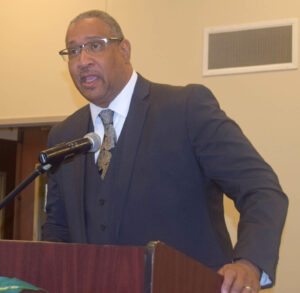
Jones has worked to unify the community across denominations and different churches as part of Unity in the Community, a movement of the Holy Spirit to mitigate division and bring the community together.
Jones also serves his community as Student & Family Support Coach at Austin-East High School in Knoxville, where he lives with his wife. He serves the school system through Project Grad, a project for helping children reach their potential, which he says keeps him busy.
“I thoroughly enjoy that ministry as well. I call it a ministry because that’s what it is to me,” he said. “Helping our children and their families with their social challenges, just helping support our families, whatever social needs they need in order for the children to get to school safe, to be nurtured, to receive their education, to graduate and to move on to college, or technical school.”
Although the work of Project Grad is well known, and well-received in the press, Jones practices the love that he preaches in his community, even where there are no guarantees of recognition, but where he is needed nonetheless.
Dockery said even if a person was not a member of the church, Jones would show up for them.
“He would just be there,” Dockery said. “If someone was sick, or someone else had died, there was Reverend Jones.”
Goodrum nodded along.
“He has done more funerals for people he don’t know,” she said, laughing, to which Dockery agreed and interjected, saying he is an all-around good guy.
“It’s not like, ‘I’m going to show up on Sunday, and then I’m going back home to Knoxville,’” Dockery said. “No! He was two or three times a week, like, ‘What are you doing here?’”
Dockery said over the years Jones showed up unexpectedly in her own life.
“My aunt’s funeral in Knoxville, I didn’t know he knew her,” she said. Again, Dockery asked him, “What are you doing here?”
Goodrum said Jones passes all her personality checks.
“I am not a nice person,” she said. “If I don’t like you, trust and believe I will tell you. Jesse Jones—I can not find a reason not to like this man. He’s just a good person, and he likes me, in spite of myself.”
Jones said he was sad to leave Newport – observing that there are no differences between God’s children here, and those in Morristown, where he started working in late March – but that it was here where he learned the love of the community.
“I’ve really been graced in love, love of the community,” he said. “I am speaking of all the churches in and around the area. I’ve had a wonderful opportunity and time to fellowship with so many various congregations and churches there in Newport. You have family and friends, from church to church, and it did not matter if they were Baptist, or Methodist, or AME Zion, or even nondenominational. I have thoroughly enjoyed getting to know the pastors in the community, the people in the community, and our families in the community. Very special.”
It was the Holy Spirit that brought him to Newport in the first place, Jones says, and it is the Holy Spirit that continues to guide him to his new work in Morristown.
Final statement from Rev. Jesse L. Jones, Jr.:
Sister Jacqueline and I would like to thank God, the Macedonia Baptist Church, our sister churches, ministers of the gospel, and the Newport community for your prayers, love and support for us over the past 14 plus years. It has been an honor and a blessing to be in service and fellowship with you and we thank God for you all.
Rev. Jesse Jones
People languish inside Cocke County jails
NEWPORT, Tenn. — Decades before the jail lost its accreditation, Cocke County has needed a new justice center. There is space. There are plans. However, the county has been unable to find the roughly $50 million it would require to overhaul the jail system. Final costs for such a project would likely exceed the entire county budget.
There does not seem to be a federal solution, nor a state solution that does not involve raising a tremendous amount of capital to fund an entirely new jail. Jail certification is not a priority in Tennessee, as indicated by a significant number of other county jails also lacking certification, but jails lose their accreditation – like Cocke County did – when they are deemed unfit for inmates, signaling a human rights crisis. Counties are left to decide on their own whether they are willing to live with that suffering in a segment of the population that can not speak up for themselves.
The latest County Legislative Body decision not to impose new taxes for the purpose of building a new jail comes as a surprise to no one.
The problem is so seemingly permanent that although some political candidates offer generalized solutions in their platforms, renovating the jail after 90 years is no longer an election issue. After another failed vote in March, Commissioner Forest Clevenger appealed to the CLB for a better solution than simply raising taxes.
“It’s an election year and we have several candidates running for mayor and sheriff, and I have listened to some of their platforms on social media and through others,” Clevenger said. “Some of them think they have a better plan and that we don’t have to do it this way. I’m all ears. If they have one and we don’t have to do this, I want to hear it.”
Clevenger said that in his three years serving county government, no elected official has offered a viable plan or solution.
“You have a finance director, county mayor and sheriff you all are paying $272,000 a year and yet I’ve heard nothing.”
At a forum in March, County Trustee Rob Mathis said the county could pay the annual debt expense of a new jail using an equivalent tax revenue increase, already in progress. Other proposals heard in the past would require raising property taxes.
“I want to hear something that we may have missed after doing this in all these committees for three and a half years, day in and day out,” Clevenger said. “If there is something better we can do I want to know about it because right now we’re facing a $50 million bond issue that our children will be paying off.”
The matter was sent back to General Committee, but is not shown on the agenda for Thursday night.
Whatever the solution may be, it appears that every option in the conversation pits taxpayers against the county’s most vulnerable people, including the mentally ill and those suffering from addiction. Addiction accounts for the bulk of police reports, which end with the phrase, “for their safety, they were arrested and transported to the Cocke County Jail Annex.” These reports are publicly available, provided under Freedom of Information Act guidelines that may protect some sensitive information, such as the addresses of deputies, but do little to preserve the dignity of the parties involved.
A combination of indifference toward incarcerated people, distrust of government, historical discrepancies between stated intent and actual use of county funds, and county-wide poverty has instilled a near-universal resistance in citizens to agree to increase their own tax rates.
While the problem is deferred meeting by meeting, and the conversation goes nowhere, and while users tell jokes about it on Facebook, people have died, they are sleeping on the floor in black mold and more than 20 women are sharing a single toilet.
When the subject arises of poor jail conditions, it is easily dismissed with the refrain, ‘Jail is not supposed to be fun.’ Guards and inmates will attest that Cocke County jail is punishment, and indeed not fun, but it is also dysfunctional to the extent that it fails to serve the community. The intended outcome of prison or jail time is to play a role in rehabilitating offenders so that society is improved by the jail as a service, instead of compounding harm through punishment alone. Moreover, conditions at the Cocke County Jail and Annex prevent the most important stage of incarceration – and its stated purpose – rehabilitation, from taking place.
Because of conditions in the jail, people actively working to resolve drug dependency are hindered from completing that already difficult and sensitive work, says Director of Recovery Ministries Marta Cogburn.
Cogburn is a family nurse practitioner working to rehabilitate people in Cocke County who struggle with substance issues, many of whom come into her program from the jail. She says the county has several issues with social resources, and that conditions in the jail complicate her work curbing substance misuse, calling the conditions there “horrendous.”
“One of the shortcomings is the jail, and the overcrowded conditions,” she says. “That is an inhumane place. I was in the women’s cell. They’re sleeping on the floor, on a mat on the concrete floor. It’s no wonder they fight—bring drugs in—they have to live through it. It’s a horrendous thing, until we can make that more humane by getting better services tailored to the needs of the patient.”
Tennessee Department of Correction data shows that the Cocke County jail population consistently exceeds the number of beds.
At the time photos were taken in February, a jail administrator said there were 114 people in the courthouse and Annex combined. Data from February shows 120 available beds for both jails, but with a total population of 136. Data puts the jail above the courthouse at 146.9% capacity.
Historical data shows the jail population reaching nearly 200 people.
Cocke County Sheriff Armando Fontes says throwing people in jail does not cure addiction, and that investment in the jails is “much needed.” His administration saw the beginning of a Jail Chemical Addiction Program, the first of its kind in Tennessee, which began last summer and has graduated two classes on their way back into healthy society.
Because drug use is so prevalent in the jail, the TN JCAP unit is sequestered from the main jail above the courthouse, so that students there will not be tempted to use, and remain separated from the behaviors and attitudes of active addiction among the other inmates.
“It’s a central hub where all of your people with drug addiction – people that commit criminal acts – but a lot of that is because of drug addiction and it’s where all the community’s problems go to,” Fontes says of the jail. “It’s important that these jails become facilities that are focused and geared toward rehabilitation because, you know, there’s a lot of people that are still salvageable and unfortunately, we don’t have the resources in our jail to do a lot of things that I would love to have done, but we never could get the financial support.”
Fyodor Dostoevsky, a military surgeon and renowned author, once wrote that a society is judged “not by how it treats its outstanding citizens, but by how it treats its criminals.”
On Wednesday, February 9, a jail guard throws Misty Rodriguez 12 feet across her cell, where she sustains head injuries, bruises and loses a tooth. Her accused attacker, 21-year-old Bryson Hance, is fired from his position at Cocke County Sheriff’s Office.
Thursday, October 28: Kelsey Wolfe is reported dead of drug overdose while staying in the jail, although her family disputes it publicly on Facebook, saying they want answers. In response to ridicule and dismissive jokes, her family asks others to consider that she is a person, grieved by friends, family and her children.
Monday, August 16: Todd Douglas uses jail-issue clothing to hang himself in his cell where he is housed alone.
The rate at which inmate deaths are documented in news sources suggests they are being under-reported in official data, which is sparse.
The Newport Plain Talk was granted access in February to the Cocke County Jail Annex and the jail over the courthouse. In addition to those printed here, 300 photographs are available in the online edition; however, images and words do not convey the whole story.
No cell is ventilated. At 100% humidity the combined smell of mold, chemicals, the Newport water supply, and the smell of too many bodies in one place permeate the jail, sticks to the hair and clothes, and is strongest at the Annex where flooding occurs and people are forced to sleep on the floor.
Open drains where the grating is broken or missing are coated in a gray slime, congealed around the inner openings. A mop bucket sits unevenly, missing a wheel. Inmates mop the area, pushing filth into the exposed drain, three feet away from a wet bedroll on the concrete floor, its edges damp from the mopping. Black mold grows in corners around the ceiling. A small tray slot in the door is left open, the only point of ventilation in a cell where more women sleep than there are beds. Their hair is greasy and wet looking. It is not their fault.
“It’s horrid,” says a jail Annex nurse. “Horrid.”
She says sometimes she tells the guards not to put people in the cells. Turning to Cecil Holt, administrative lieutenant over the jail, she asks if he has shown the black mold to The Newport Plain Talk. He did. Guards, nurses and other correctional officers breathe the same air as the inmates.
“I have to shut down some of the filth sometimes, and tell them not—like, ‘Look, you can’t put anybody in here because it will take your breath when you open the door,’” she says. “It’s not safe to have somebody in there breathing that stuff, and sometimes we don’t have a choice. We have to put them in there anyway.”
A woman inside complains that each time she blows her nose, blood comes out.
It is well known that there are holes in the jail exterior walls, and fences have been constructed around some sections of the Annex jail, near where the women are currently housed, to prevent people from drilling new holes for delivering drugs into the jail. Metal shields are seen covering the old holes. Still, the winter winds manage to break through.
Broken windows on the courthouse exterior are a fitting cover to the equally broken story within. Holes in the walls around the building, lax security, inmates routinely crossing the train tracks between the Annex and courthouse lawn, and staff shortages create the conditions for escape, corruption and drug proliferation throughout the jail system.
Police reports occasionally mention arrests involving people attempting to throw parcels of drugs into jail through the broken windows on the third story of the courthouse. In other cases, guards themselves were found bringing drugs into the jail.
The sole Black inhabitant on the day of shooting is found in the suicide watch cell. Because the unventilated room triples as a bathroom and shower, the entire floor is wet, the air is humid and smells strongly like the rest of the jail annex. She lies motionless under a stained, green blanket. Her empty food tray sits two feet away on the wet floor. On the wall someone has scratched a message: “I was put on suicide watch as punishment.” Another writer responds, “Sometimes it be like that.”
Placing the jail directly above the courthouse has been impractical, and led to some practical jokes. At least one cell in the courthouse jail was converted to a nurse’s station at a judge’s request after inmates in the cell above his chamber learned where they were, and began flooding the room, draining dirty water onto his desk.
On the day when Newport Plain Talk documented the interior, the jail above the courthouse was staffed by a single guard: a pregnant woman who has to request coverage, wait for help to secure their posts in the Annex, and arrive at the old jail before she can leave to go to the bathroom, which is located in another area.
Her post is a noisy room with a view of the Annex, containing two broken air conditioners where the security camera system hub is located. Exposed wires run to the camera system, which buzzes loudly. It never stops, she says.
The entire jail system is serviced by a single small kitchen, a family-size washer and dryer pair, and sometimes just two guards are responsible for upwards of 200 people.
Until the citizens of the county can agree upon a way to repay a $50 million loan, the horrors taking place at the Cocke County jail will continue unabated.
The matter sits in General Committee, awaiting further discussion.
Photos: James K. Galloway
CCHS senior wins full scholarship to University of Chicago

NEWPORT, Tenn.—After being awarded a significant scholarship, a senior student from Cocke County High School will be attending one of the top universities in the country, beginning this fall.
17-year-old Destiny Jenkins has been awarded the Questbridge National College Match Scholarship for the University of Chicago, where she will major in Global Studies, minoring in Human Rights.
Questbridge is a nonprofit based in Palo Alto, California. Since 1994, the organization has connected exceptional, low-income high school students with top colleges.
Through the scholarship, and through recognition of her discipline and hard work, Jenkins will be joining the same prestigious school that has turned out 94 Nobel laureates, including Milton Friedman, Charles Huggins, and Albert A. Michelson, who measured the speed of light in 1907, becoming the first American to win the Nobel Prize.
It is a school that turns out historical figures nearly as consistently as the diploma itself. Former President Barack Obama was a professor at the University of Chicago Law School for 12 years, until becoming president in 2008.
Getting into the University of Chicago is difficult, as the school is among the most selective in the nation.
In order to be considered for acceptance, a prospective student must show a 4.48 grade point average. Even still, the acceptance rate for students wishing to attend is just 7.3% of all applicants. For reference, Harvard is 5% and Duke University accepts 7.6% of prospects.
Getting accepted to a top-tier university seems to have been easy for Jenkins. Teachers say she had already done all the hard work in school, where she is currently taking three dual enrollment courses and spends less time each day at the high school than spent working on college-level material. The more difficult task, as is often the case, was coming up with more than $300,000 to pay for it.
“I had looked at University of Chicago before, just because of their human rights program,” Jenkins said, “but I was like, ‘I just don’t think I can go there. It’s like $80,000 a year. No way!’ But then I applied for [Questbridge] and I was a finalist.”
Being a Questbridge finalist did not mean she had secured the scholarship, however, and she expressed some doubts to her older cousin, Brandy Strom, who has played the support role of a caring adult in Jenkins’ life. Strom said Jenkins told her she was worried she would not make the second cut. Out of more than 6,000 applicants, Jenkins was one in 145 matched to the University of Chicago.
“When she first got into the program, she was like, ‘I can’t do it, I’m not going to make it,’” Strom said. “I was like, ‘Girl, you are going to make it.’ It feels so good to see her come so far.”
Jenkins said she believes it was the attitude in her essays that got her a match to the University of Chicago. Instead of focusing on the negative aspects of the conditions for needing a scholarship, Jenkins wrote about the positive things she learned, and how she grew as a person from difficult experiences. In the essays she expressed gratitude to the family who let her down, as well as the family who picked her up with her brother, without a second thought.
“I feel like a lot of people when they’re writing their college essays, they’re like, ‘Feel bad for me!’” Jenkins said. “I wrote about my mom and my dad, and all that, and I wrote about like, human rights, why I want to do that, but I like, focused on the positive aspects, instead of all the negatives so I feel like they liked that.”
She is accustomed to helping people through her love of writing, by looking over friends’ material or helping her brother construct his own essays.
Jenkins explained in an essay for Questbridge that since she wants to help people, she was first drawn to medicine. However, she later explained that she found her purpose after taking a government class she liked in school. At the same time, she said the events in the summer of 2020 and rise of the Black Lives Matter movement for equality and police accountability got her interested in civil rights.
She made that point in her essay where she stated that she wants to “help those who can’t help themselves, those who have been wronged for simply having a different skin tone, having a different religion, or even for loving someone of the same gender.”
Jenkins said she would like see change in the healthcare system and immigration system, but she sees herself becoming an attorney, working to improve the justice system.
Jenkins is an understanding friend, said Kaylee Large, a freshman at East Tennessee State University.
“I’m going to miss her so much,” Large said of her best friend. “I go to her for everything.”
Large said she and Jenkins have common experiences, and she had never met someone who understood everything she has been through.
“I think she deserves it more than anyone else I’ve ever met,” Large said. “If anyone’s going to change the world, it’s her. I feel like this scholarship just really helps her get to that point.”
Jenkins said one day she was in class discussing crime and race, when a student raised a common misinterpretation of crime statistics as his reason for avoiding East Knoxville.
“He’s my friend now. I set him straight,” Jenkins said, laughing out loud. “But he was like, ‘Well, on the news, you know, it is mostly Black people who are the criminals.’”
Jenkins disagreed with the premise. She said in many cases Black communities within cities don’t receive the same resources as other groups because of the color of their skin, which leads to systemic failures that produce crime, inevitably forcing them into the news, and people do not care to challenge that as a representation of the entire group.
“First of all, you don’t see a lot of Black people shooting up schools, shooting up banks, shooting up churches,” Jenkins said. “Second of all, most of these Black people live in poor communities and they don’t have the resources or support to do better things, so their first go-to when they need money – but they don’t have job opportunities because people don’t—they won’t hire Black people, you know? Then they have the high schools in the cities they were raised in. They don’t get the education that some white people or even other Black people might have – and then so their first go-to is, ‘Oh, I’m going to deal drugs because it’s easy money. Easy way – they have people teach them how to do it. Then they get busted, and then they’re in jail, so then what? If they have kids, and their kids—their father’s in jail, so they don’t have anyone to raise them, and then the cycle just keeps going, going, and going, all because they didn’t have the support that other people might have. So I was like no, it’s not only Black people.”
She said she got through to him.
“He was like, ‘You’re right, you’re right.’ I said, ‘Yeah, I am right.’”
Jenkins, whose mother is white and her father is Black, wrote in her essay that she has encountered racism directed toward her. During her interview, she said because of her complexion she does not experience as much, but said her friends face discrimination, and her brother has, too.
“I have a twin brother, but we look nothing alike,” she said. “Even like, 7th grade, you know, he was getting called the N-word. My little cousins in 7th grade don’t even know what that means. They just never really heard it around. We don’t say that at the house, so—and they’re white.”
Jenkins has already visited the school in Chicago, and said she likes it. She said she is happy that she will soon be able to work and learn in a more open, accepting environment.
“I feel like people don’t care to be who they are there. It’s very different,” she said, smiling. “A lot more culture there. A lot more diversity. It’s huge. It’s like Hogwarts.”
Jenkins herself does not feel pressure to be anything other than who she is, but observes that others living in the region face pressure to fit a certain mold.
“I’m pretty average,” she said, “but maybe for someone else, who’s a little more – I don’t know – not what people here see as normal, they might not feel very open to being who they are.”
She said racist and homophobic slurs are still commonly used among students in the halls at school, and that even some teachers convey racist attitudes.
“I feel racism is a big thing in Tennessee, anyways, but yeah there’s obviously people who go to school who, you can just tell, sometimes. And then some teachers, too, they act different toward students.”
She told the story of a fellow student who was excited about starting a career with Dollywood’s Splash Country after the company sent representatives to a job fair at the high school. She said his enthusiasm was met with a racial “joke” from one teacher.
“It was one of my friend’s brothers, actually. He’s Black,” she said. “He was like, ‘Well, I’m going to work at Splash Country,’ and they were like, ‘What do you mean you’re going to work there? You can’t swim,’ all because – you know, he’s Black – which is very, very out of place. You know, like he saw it as a joke, but then people—I feel like a lot of people here don’t realize what they’re saying can even be racist, or sound as bad as they think it does.”
Jenkins is on good terms with her teachers. Katie Banks has been Jenkins’ math instructor for two years at Cocke County High School, and she says Jenkins’ hard work and perseverance are paying off, but that she has remained a humble student.
“I just think it’s absolutely amazing, especially since I’ve recently read some articles about that college, and it’s very, very difficult for anyone to get in there, more or less somebody from out of state,” Banks said. “She did a wonderful job.”
Jenkins thanks her family for supporting her and making her who she is today. Although she was not mentioned in this article, in addition to the other sources she named her maternal grandmother Nanay, Angie Jenkins, as being instrumental in her success. They live together in Sevierville.
Jenkins is in a group chat with other recipients of the scholarship who are going to her school. They are sharing experiences and coordinating a possible meet-up upon arrival in September. Jenkins will graduate from the University of Chicago in 2026. She plans to attend law school.
This story appeared in The Newport Plain Talk.
Second class graduates from new rehabilitation program

NEWPORT, Tenn.—Nine men graduated from an addiction program Friday at the Lincoln Avenue Baptist Church, and are now advancing to the next stages in their recovery. They are not to be considered out early, but have instead earned their place back in society through layers of hard work, proven sobriety and a commitment to improving themselves, by way of a new recovery system in the county jail, known as the Tennessee Jail Chemical Addiction Program, or JCAP, which started last summer.
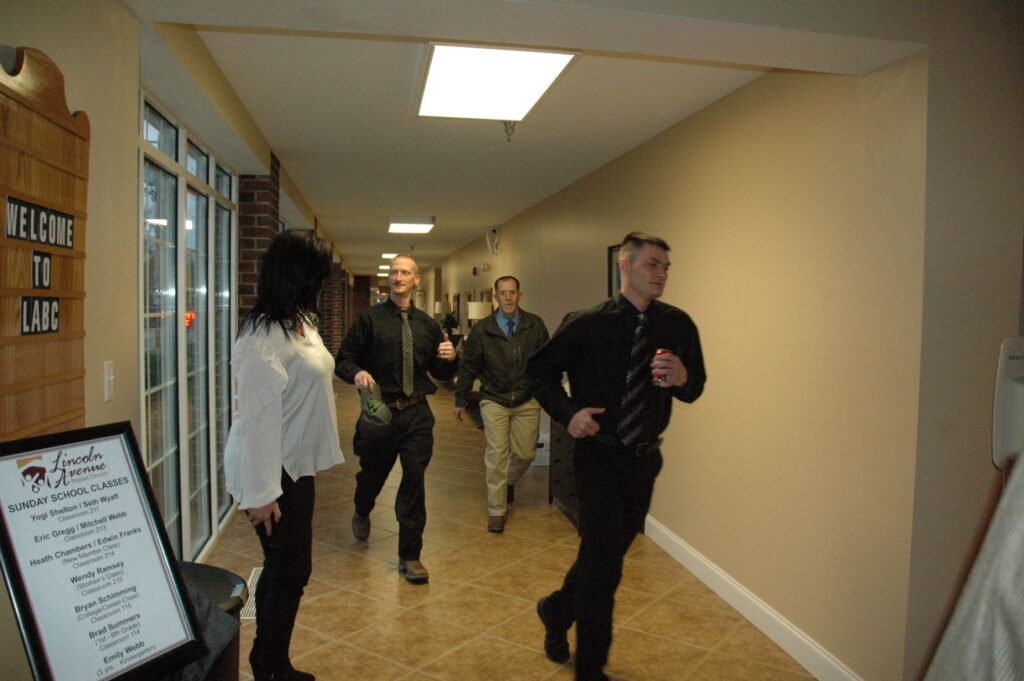
Newport native William Dalton Hall, 25, is the youngest of nine men to graduate Friday night. A musician with a range of talents, Hall told an audience of about 100 how his struggles with addiction took relationships from him.
“I’ve burnt bridges, whether it’s been my family, my friends, my wife—but I believe God’s going to bring all that back together,” Hall said, to exclamations of praise.
Someone called out from the congregation. “Come on,” he said loudly, with jubilation in his voice. From the middle of the room, another man shouted, “Amen!”
Hall continued.
“This class has really taught me you have to put God first. You have to have something that is going to be your driving force, and once you get God in your life, then you’ll be able to put yourself there. You’ll be able to tear down the strongholds. You’ll be able to examine yourself: all your bad flaws, all your bad habits, and then you’ll be able to take control of them so you’re not living in the past no more. You’re just going to be focused on your future, and where you’re going.”
With a stern demeanor, Hall said he wants to attend trade school, get a house and rejoin his family. Six graduates from the previous class – the first of its kind – sat behind him on stage, quietly supporting from the choir section. To be allowed back on the stage, they are also passing drug tests, and adhering to all program rules.
All men on the stage overcame many barriers and challenges to get where they are today, but continue to face stigma, said Westcare Tennessee Program Director Shandi Hill during her speech to the audience and graduates of the program. Standing on stage, she turned around and thanked them for overcoming those challenges, and working with her and her team.
“They do not have to talk to us about their problems, but they did,” Hill said. “They opened up to us. For us being women, for them to open up to us, is huge. That’s big. That’s another barrier that they had to take down.”
She said their challenges continue, as graduates from the program must now press on in the shadow of their histories, as they attempt to live, and find work, dragging behind them the social perceptions, and misconceptions, of addiction.
The National Institute of Health says that for people with a substance abuse disorder, stigma may stem from antiquated or inaccurate beliefs that addiction is a moral failing, rather than what science has shown: Addiction is a chronic, treatable disease from which patients can recover and continue to lead healthy lives.
The institute states in literature and on their website that feeling stigmatized can reduce the willingness of individuals with substance use disorders to seek treatment. NIH research has shown that stereotypes around such disorders can lead others to feel pity, fear, anger, resentment, and will often cause others to distance themselves from people struggling with addiction.
“They are now a different character,” Hill said to an audience of about 100, holding back tears. “They have wisdom. They have self-discipline. Please don’t judge them and continue to put that barrier up on them. Please uplift them and uplift their spirit, because these guys have changed, and we have seen it.”
The privilege of being enrolled in JCAP can be best appreciated by being in the room at the courthouse jail where the work is being done, where students study literature, self-care, and actively participate in their own rehabilitation. In stark contrast to the rest of the jail – where men and women sleep for most of the day, read, talk, or watch television – the JCAP wing at the western end of the jail is attentive, awake, lively and distinctly optimistic. The men wake up at the same designated times each morning, get up and out of bed, complete assignments, read, create art and keep journals documenting their studies and progress. The environment is clean, forward-thinking and hopeful.
Leading up to the first JCAP graduation, which took place in October, work getting the project off the ground was eight years in the making, said TN JCAP Coordinator Dan Williams, of the Cocke County Sheriff’s Department. Williams said the biggest logistical obstacle to instituting the JCAP program in the jail was finding the space.
Because the jail is so old – dating back to 1932 – modifications had to be made, converting their unit from a cold punishment facility into a dormitory, classroom, art gallery, bible school and space of quiet rehabilitation.
He said the jail nurses researched colors conducive to education, and wanted to provide them with an environment more conducive to bettering themselves.
“And then if you’ll notice, inside the bunks it’s a different color,” he said, “and they did research on the colors that were conducive to rest and relaxation, so we painted the inside of the bunk rooms where they sleep, that color.”
He also had to cut out the bars, creating an open plan, offering more space for a boardroom setting, as well as freedom of movement within the JCAP unit itself.
Chief Deputy C.J. Ball said he liked Williams’ idea to transform the jail, but that he did not know how he was going to do it.
“During that time, I get these phone calls,” Ball said, from people wanting to know what was happening. “After everything in the courthouse was smoked up, fire alarms going off, everything worked out well.”
Modern fluorescent light fixtures now hang from the remnants of iron bars.
The program supports 12 inmates from the jail, Ball said, but 125 beds are needed.
“We’re going to try hard to keep on getting that to where it will work out,” Ball said during his keynote address. “We must provide as much help as possible, OK, and it takes us all to do that. We want to see every single person that comes into our facility walk out the door with some form of help from our staff, the rehabilitation programs, jail ministries, and assistance from you all.”
The space needed to be as close to free standards of living as possible in order to prepare the men for the real world, since all nine men who graduated Friday have since reentered society with full-time jobs, with benefits and regular schedules.
“These guys graduated class on Friday, and we had them at orientation for their job on Monday,” Williams said.
Next, they will move into a sober living house, continue passing drug tests, and demonstrating their ability to sustain a life of duties and obligation without substances. This phase lasts for about six to nine months, which the graduates must complete before exiting the final phase of the program, thus completing their legal obligation to the state of Tennessee.
However, Williams emphasized that although his graduates are legally obligated to that six-to-nine-month period, they are not limited to it.
“Once they complete their six to nine months with us, they do not have to leave. We don’t pack their stuff and say, ‘Good job, you know, go find you a place to live,’” Williams said. “They are allowed to stay here as long as they pay rent – pay the normal rent that we charge – and go by our rules. They’re allowed to stay here until they’re financially or mentally ready to move out on their own.”
Full video of the graduation ceremony is available at the Lincoln Ave Baptist Church Facebook page.
This story appeared in The Newport Plain Talk.
County seeks new ambulance contract, faster response times
NEWPORT, Tenn.—County officials decided to reevaluate their contract with First Call Ambulance after a Tuesday meeting of the Public Safety Committee, in which members met with medical executives and emergency responders to discuss the conditions responsible for poor ambulance response times and coverage gaps. Unreliable ambulance service has led to confusion, uncertainty, and at least one death when an ambulance that was promised never arrived.
The Chancery Court meeting of 27 people was one in a series of discussions around the ongoing arrangement with First Call Ambulance, the ambulance service with an exclusive contract to service the county. With that contract coming up for renewal in June, the committee is taking a hard look at the exclusivity clause, a stipulation in the contract preventing Cocke County from hiring another company to pick up the slack.
In January of last year a Cosby family lost a loved one to cardiac arrest. The family was told First Call was on the way; however, they received another call saying Gatlinburg EMS was dispatched. In fact, no one came, and that person died.
At the time, all four ambulances available to the county were on other calls.
Response times under the current arrangement are unacceptable, said Forrest Clevenger, Vice Chair of the Public Safety Committee. Clevenger said a previous Newport Medical Center executive emailed him a range of data showing high response times.
“I understand we’ve got an exclusivity contract that won’t allow someone else to come in. I’m wondering how we are going to be able to work then, where that’s not going to be a problem,” he said. “I don’t want someone sitting here at the dialysis office waiting two and three hours for transport because the service we have doesn’t have an ambulance. I don’t want someone waiting to be transported out of your hospital for emergency or non-emergency for several hours because we can’t get another truck from somewhere, another county, or this county. I’m wondering if we get our attorneys to look at that exclusivity clause, uh, have some sort of a lenience that it goes out the window after an hour, two hours, whatever, that if they can’t produce someone in the next couple hours to make this call, we can go on down the list.”
Clevenger said there have been ambulance services in previous years that have offered to pick up the slack and take nonemergency transports, but were rejected on the basis of the exclusivity clause of the county contract with First Call.
“That’s money. I understand that. I mean, that’s bread and butter, but it’s also people’s lives,” Clevenger said. “It’s also a great discomfort and disservice to citizens if they’re having to sit four hours. You’ve got a person on dialysis that’s having to wait in a lobby for four hours, before they can get a ride back? That’s unacceptable.”
The committee heard suggestions for putting new measures in the contract that would hold the company accountable in the future, such as fines when the service does not meet expectations within a certain time.
The current terms of the contract do not work, said Scott Williams, CEO of Newport Medical Center.
“The contract you’ve got right now, the best ambulance service in the country would fail,” Williams said. “It just won’t work.”
He said it is not the job of the county to decide on the number of ambulances or EMTs on retainer, but simply to state the county’s needs in terms of response times and quality of outcomes, and that by contract the ambulance service is charged to provide it. He said the committee needs to adjust its contract terms to clearly state the county’s needs and that it should include measures to be taken if those needs are not met. He also told the committee to get ready to meet the added cost of a bolstered contract.
“Consider funding it, because you get what you pay for,” he said. “This is life or death.”
Williams said the county should reassess its priorities. He said the county spends more on the dog pound than its ambulance service, although his claim could not be independently verified at the time of publication.
“The ambulance has trouble when they’re tied up on calls and we don’t have anybody to take that person to Chattanooga, or to Knoxville, or to Johnson City,” he said. “I would implore you that in the contract that there’s things put in the contract, that those resources are available that we can transport patients to that higher level of care, and save lives.”
Williams said the ambulance team, with only two trucks in the county, faces the inherent challenge of being called around the county, containing about 800 miles of road, while also being tasked with longer transports to higher level care centers.
“This is the one public service that you need, and you need in a hurry when you really need it, because minutes matter to a stroke patient, to a cardiac patient,” Williams said. “That response time is what’s so, so very important.”
After more discussion between Williams and Clevenger around the logistics of using such a small number of ambulances, Clevenger said the county had been threatened with litigation after expressing a need to hire on extra help to bridge the largest gaps in coverage.
“What I’ve heard from one place, which will remain anonymous, is that they were having to wait three to four hours, and when they threatened to call another ambulance service, they were told by First Call that they will be turned in to the state, there’ll be a lawsuit, and threatened,” Clevenger said. “That kind of bugs me, I’ll be honest with you. We’ve got a person, one of our citizens, that just went through dialysis, who’s sitting on a hard chair in a waiting room for four hours, trying to catch a ride, and then when they’re told that we’re going to have to get somebody else, um, out of threat of losing whatever moneys that ride is going to provide, they’re going to threaten with a damn lawsuit. Get this person home. You know, get them home. Don’t threaten to sue them. You know, that right there shows me where your heart’s at, you know? Get—Get in your car, go over there, and you transport. Don’t threaten to sue this man, or this person. That is just unacceptable.”
Williams presented leaders with sample contracts in use by other states and counties, many of which contain the provisions for which Clevenger is asking.
“You all are charged with the hard task of, ‘Where’s the balance between the money, and the lives?’” Williams said. “I don’t envy you.”
Clevenger said First Call should not take all the blame. He said the county must take responsibility for its role in accepting a contract on terms that max out the company’s half of the agreement to provide, keeping First Call medical personnel busy, yet unable to meet the full needs of the county.
“The contract’s bad right now, in my opinion, but we didn’t do that,” Clevenger said. “We have the opportunity to fix that, correct that for the county, and that’s something that we really need to take seriously.”
The discussion later turned to the specific terms of the exclusivity clause, or “non-compete clause” as people began referring to it during the conversation. Mayor Crystal Ottinger attempted to clarify whether the clause still allowed individuals to source their own ambulance services, besides First Call, and trying to ascertain that the main point of the clause was that only 911 operators are restricted from asking another company to transport patients.
At that point, newly-elected Chairwoman Gayla Blazer invited the public to clarify any misconceptions or misreadings of the contract. Her gaze moved to a man in the back.
“Is that correct? You’re here,” she said, gesturing to First Call President and CEO Scott Yates, who appeared unprepared to be called upon. She asked again. “Is what I just said correct, or not correct?”
Yates stood up at his place in the back of the room, introduced himself, and from there spent three minutes agreeing with the consensus that there is a need for stretcher vans in the county. Then, for the next two minutes he addressed the terms of the exclusivity clause, stressing that Priority Ambulance is the largest service provider in the state, having acquired First Call, and saying First Call follows state regulations and protocol.
He responded to a previously expressed desire by the committee to find another provider, by emphasizing the company’s ability to pay fees and meet state regulations, suggesting the county’s options are limited.
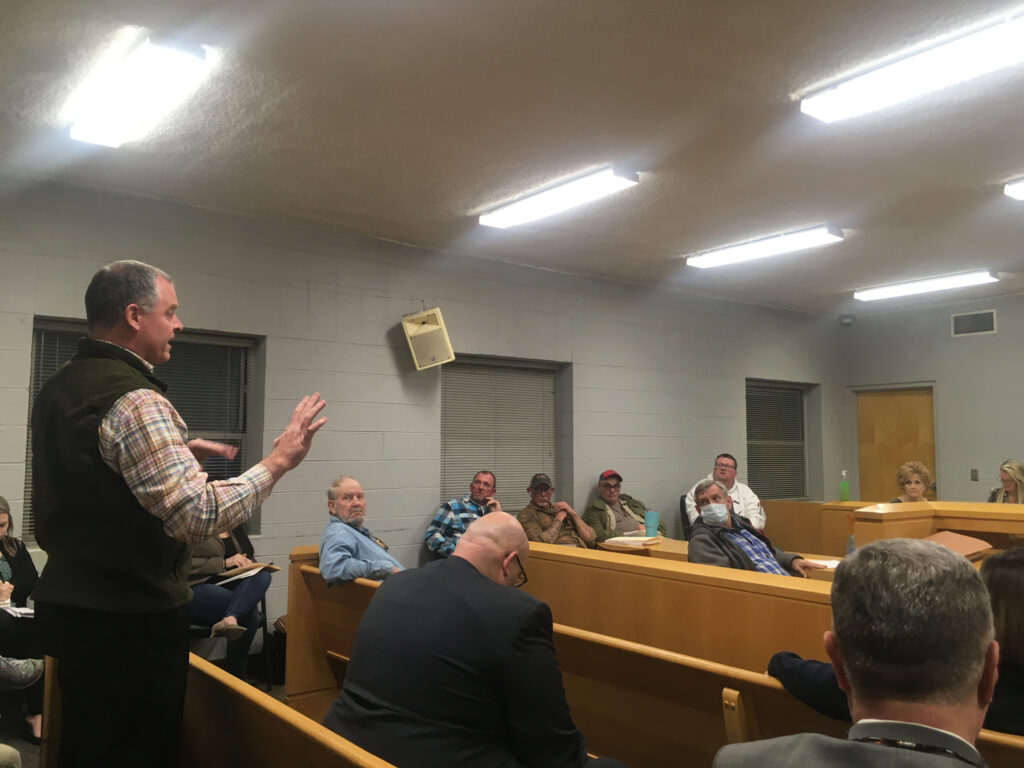
“All ambulance services operate under state rules, right, and every ambulance service has to be licensed in an area within the state. That sometimes, that could be a city, sometimes it’s—and most of it is the county, and uh, in order for an ambulance to provide service to citizens in a county, the c—the service has to be licensed in the county, so it’s a bit of a—it’s not as much, sometimes, First Call is not saying, ‘Hey, nobody else come in.’ Uh, it’s the state regulates this. We pay a lot of fees to the state, for—by ambulance, and for our county license for Cocke County, and all the counties that we serve, so there’s some issues there … I can tell you, for First Call – and we’re part of the Priority family of—family of companies – so we’re all over the state, you know, look, I can’t think of any circumstance ever, where we’ve said, “Hey, we can’t do this but you can, and a patient needs it, please provide the service, whether that’s a transport from a hospital to another hospital, or from a—from a nursing home to a dialysis clinic. You know, sometimes they have to, you know, make sure that we’ve got—we’re following the state protocols and there’s good communication. But, uh, we get asked all the time to do things where we’re not licensed to, but you know what I do? I call the MS Chief in the county, and I say, ‘Hey, we’ve got this request, uh, is this OK for us to come in?’ and just about every time, they say, ‘No no, we’ve got it covered. There must have been some miscommunication.’ Say, ‘Fine, call us back if you need us. We’ll be happy to help out, if we’ve got resources.’ That happens all throughout the state, First Call, and pretty much everyone in this organization. So I just want to make sure you understand, kind of, some of those protocols.”
His remarks were met with silence.
“Thank you so much,” Blazer finally said with a laugh. “Who was next?”
There will be another meeting of the Public Safety Committee at the Chancery Courtroom in the Annex on Monday, Feb. 28, at 6 p.m.
This story appeared in The Newport Plain Talk.
School Board hears legislative proposal to streamline testing
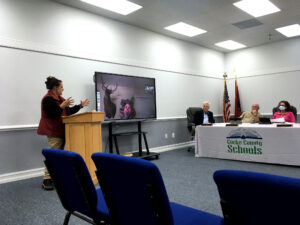
NEWPORT, Tenn.—An administrator from Cocke County High School addressed the Board of Education (BOE) on Thursday, to let them know she is in talks with Rep. Jeremy Faison to propose legislation that would integrate 10 “hybrid” learning days into the annual high school school calendar, in order to accommodate state testing.
Under present conditions, CCHS Curriculum Coordinator Nancy Brawley told the board that students are faced with interruptions, bell schedules and other distractions not conducive to testing for the End of Course (EOC) or ACT tests, which take several hours to complete.
“You have to interrupt the bell schedule, at this point, for four days, because ELA has two extended tests that are 85 minutes and 95 minutes,” she said, referring to the English Language Arts portions of EOC testing. “When you’re testing four blocks a day, you can only do two blocks a day, because you have to disrupt the bell schedule, which means you disrupt the lunch bell schedule. I mean it’s—it’s crazy, and that’s just to do ELA.”
She said it would be simpler if educators could have days when they bring only the students who are testing to campus, in order to establish a proper testing environment. She said she came to the conclusion to approach Faison about submitting a house bill, after discussions with the board, and with people versed in state law, who informed her that the code clearly states certain students can not be asked to stay home while others use the campus for testing.
She said students coming into the school who are not testing, and remaining on a bell schedule, can be disruptive. She cited other logistical barriers to successful test taking, such as testing rooms being adjacent to noisy cafeterias or gyms, which also improved testing during COVID, when students were distanced and allowed to test without the disruptions of daily school life.
“When we did EOC testing, when we were in COVID, we simply brought all the test takers into school that one day, and we did all ELA in one day, and all the math in one day, and it was all done in one great swoop,” she said. “I was like, ‘Well, can we not just do that again?’ Well, I can’t.”
At the meeting, Attendance Supervisor Dennis Balch clarified the law.
“It’s in the law that every student has to be in school for 180 days,” Balch said. “Any change to that calendar has to be approved by the state. In the law itself, it simply says that you can not have a student not attend school because of testing. That’s what she’s trying to address.”
Brawley said by utilizing remote learning to create 10 “hybrid days” per semester, she would be keeping students in school – and within state guidelines – by having teachers conduct their classrooms via Zoom, like they did during lockdown, to provide a more efficient testing environment. She said with effective use of technology, the lessons could be of the same quality as what the students are receiving in school.
She stated via text that she and other Cocke County educators are proposing to have test takers on campus no more than five days per semester, and that non test takers will have a remote assignment.
Because of strict State Department regulations, Brawley said rather than go ahead with their own schedule changes, and risk losing their license, she and her colleagues prefer to stay in compliance as they go through the proper channels and get a dedicated allowance for testing days, where students who are testing come to school, and others stay home.
She said one of the positive outcomes of COVID accommodations was remote learning. There was some additional discussion among herself and board members as to whether online learning, a capability that has come out of COVID restrictions, could supplement students who are not testing and are instead staying home on those days, but the consensus in the room was to get a more clear response from legislators, as well as a lasting solution.
“Cocke County is actually following the law because we can’t tell kids they can’t come to school,” she said. “Well, I want to argue that we’re not telling them that they can’t come to school. We’re just telling them they can’t come to school on campus. OK? But the state says that Mr. Moore doesn’t have the ability to grant that as like, a hybrid day.”
Brawley in her address was referring to Director of Schools Manney Moore, whose attendance at the meeting took place on a large screen via Zoom, as a precaution following COVID exposure. At several times during the meeting, Moore expressed support for her efforts.
“I guess I’ve come to the point where it has to be state legislative change in order for this to happen,” she said. “Everybody that I’ve talked to outside our district has been on board.”
She said she has been in correspondence with Faison and Sen. Steve Southerland. She said Faison told her that he would write a bill in her name, and have her speak at the 112th General Assembly, which convened Tuesday, and try to enact legislative change.
In other BOE news, Moore said COVID numbers are up. He said 12 staff and 60 students have now tested positive.
“The bad part of that is 49 of those students are this week, and nine staff,” he said. “That’s pretty high numbers, relatively speaking, from where we were, at times, in the fall.”
Speaking from a room with a taxidermy buck in the background, and fish mounted on the wall, Moore said following his own exposure, he is still feeling good, and testing negative.
The Cocke County COVID-19 Task Force met this week, according to Assistant Director of Schools Casey Kelley.
“Right now the hospital’s fully staffed,” he said. “There are 27 out of 27 beds, five out of five in ICU.”
Kelley said the school system watches the hospital with their task force as partners in the community, paying attention to the availability of medical services.
Moore said the Supreme Court blocked a temporary OSHA mandate requiring workers at businesses with 100 or more employees get vaccinated or submit a negative COVID test each week to enter the workplace. He said they had been advised via email that until further action by either the government or the court, there is no vaccine mandate for public schools.
The board agreed to meet with architects at a later date – either January 29 or February 5 – a 9 a.m. meeting to address building projects and use of ESSER third-round funds.
Three CCHS teachers were tenured and recognized for outstanding performance: Health Sciences teacher Darlene Shepherd, Deborah Livesay, who teaches Art and beautifies the school, and Amanda Marion, an AP Biology instructor who travels from Greeneville.
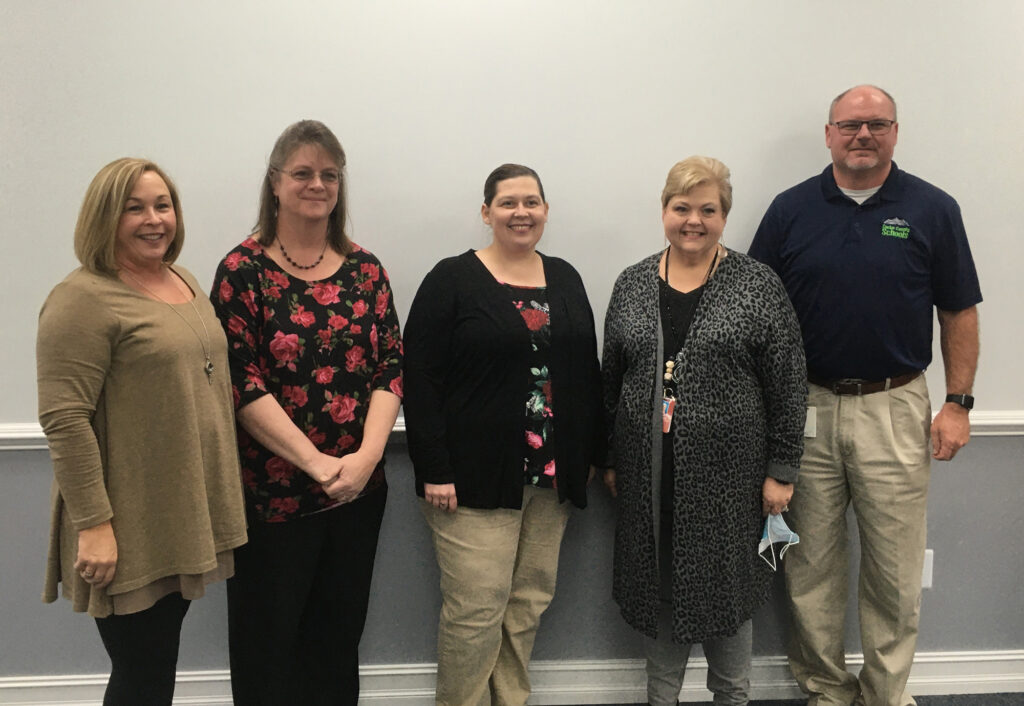
They were met with applause from the public and congratulations by the board.
On Tuesday, February 8, Kelley said there will be a school safety summit involving all department heads of all emergency response units, to discuss how to respond to random, specific incidents and explore relationships among first responders.
“All of our sheriff departments, fire departments, police, ambulance, hospital, road department—everybody that possibly could respond to an event that may happen at a school,” he said. “Each of you are invited.”
The group will decide on a hypothetical event, he said, citing examples such as an emergency happening at a building, a gas leak, or a chemical spill happening across a road near Edgemont Elementary School. He said plans could expand to include a live drill at a later date.
The event takes place at noon, lasts about three hours, and a luncheon will be provided by Smoky Mountain Home Health & Hospice. Kelley is asking that people reach out to him so he knows how many plan to attend.
This story appeared in The Newport Plain Talk.
TDOT breaks ground on long awaited Newport bypass
NEWPORT, Tenn.—Officials from Newport and Cocke County gathered to break ground on the Newport Bypass Project, a road connecting Greeneville traffic to the west end of town, that was first proposed more than 20 years ago. They were joined by Tennessee Department of Transportation representatives and legislators.

The road will allow traffic to bypass the downtown area of Newport, with the stated intention of reducing the number of transfer trucks passing through town. The project, 4.7 miles long and involving four bridges, will link Highway 321 near St. Tide Hollow Road to US 25-70 near Thinwood Drive.
Cocke County Mayor Crystal Ottinger and Mayor of Newport, Roland Dykes, III were joined by Sen. Steve Southerland and Rep. Jeremy Faison, speaking before an audience of 32 people.
Southerland said the project is a major step in the improvement of Cocke County. He said in his 28 years as senator, he made several calls asking when the project would begin.
“Cocke County is a diamond in the rough. It needs a little bit of polishing,” he said. “In the next five years, you’re going to be seeing a big change in Cocke County.”
Rep. Faison said he loves working with Charles Blalock and Sons Inc. of Sevierville, the contractor for the project, because of their effectiveness and efficiency. He said the project is a wholesome use of government money, praising the combined efforts of business, government and the community.
“Politically I’m very conservative,” Faison said. “I believe in a very limited government. That’s who I am politically, but I will say this: Part of a right and good, wholesome role of government is to build infrastructure.”
He said he is excited about the coming change for commuters.
“If you happen to live in Parrottsville, and you’re trying to get to town, and it’s busy—holy smokes, how bad—I mean, you’re all the way up to Old Town, have you seen the line of cars, all the way up to Old Town?” he asked. “This right here is going to completely resolve that. What a great day for Newport and Cocke County.”
Mayor Dykes, who said he was born and raised in Newport, has heard about the project for nearly his entire life, and is excited about new opportunities for economic development and anticipated housing developments.
“I think it’s going to open up a lot of opportunities down our 25 W corridor, it’s going to open up a lot of opportunities for economic development along this route, and throughout the city and the county,” he said. “Of course, it’s going to relieve a lot of the issues we have going on through our downtown.”
Mayor Ottinger thanked everyone who came together to bring the project underway.
“We’re finally at a point where the perseverance is finally paying off,” she said. “Seeing regional support for this project, going to the RPO meetings and having other counties who have their own projects see the need and importance of a project and vote for your project over their own, you just can’t imagine what that means to a community.”
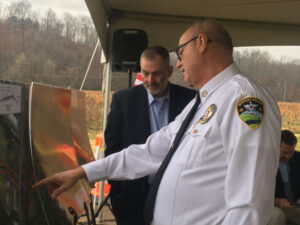
The project, costing $63.2 million, is divided into two sections. The first 2.4-mile section, according to documents published by TDOT, will be four lanes with a center turn lane, plus 12-foot shoulders. This section extends to the east from US 70 to Rankin Road.
The second section extends for about 2.3 miles, from Rankin Road to the south of St. Tide Hollow Road.
“This will include two 12-foot travel lanes, one in each direction, with 12-foot shoulders on a four-lane divided right of way,” a TDOT press released stated.
TDOT Community Relations Officer Mark Nagi stated in an email that setting of signage for the project has begun, and – weather permitting – work will begin immediately afterward.
Nagi said the project has an expected completion date of June 30, 2025.
This story appeared in The Newport Plain Talk.











